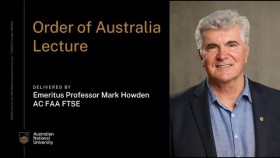Tackling 'the issue of our generation'
Climate change is one of the biggest global challenges of the 21st century. The issue is being tackled not just by scientists, but also by economists, communicators, lawyers and many other people from varying fields.
This means that people who are passionate about working on climate change come from diverse backgrounds. The ANU Master of Climate Change programme attracts people from an array of backgrounds to study this global issue.
Two recent graduates, Leah Jabornik and Rarawa Amberoti both found the programme to be engaging and a great platform to enter into a career in climate change. As a student, you can tailor the programme to your needs, which Leah found to be a great strength.
“You’re able to choose from a huge list of classes to take and build your own degree from the ground up … which means you can take classes from any field related to the environment, policy or climate change.”
Given the global nature of climate change, working internationally is an important step in achieving long-term change. Leah believed this was a great strength of the programme, with a large body of international students who could contribute diverse experiences from their own countries.
“Another thing I loved about the programme was that I got to work with students from all over the world … studying with everyone from all around the world enhanced the experience, given you’re not only learning from the lecturer or tutor but you’re learning from your peers.”
Through this collaboration with international students, Rarawa was able to see how the skills learnt in the Master’s programme would be directly applicable to tackling climate change in her home country of Kiribati.
“I’ve seen the problems that climate change is causing in my home country. This Master’s has given me the skills and knowledge to help address many of these issues when I get back home.”
Working in the realm of climate change means conversing with like-minded people but also those who do not share similar views. Being able to communicate effectively with people who hold opposing views was a highlight that Rarawa found to be most useful when completing the programme.
“An important part of this program is learning to communicate with [climate change] deniers and that will also be important in educating our people in Kiribati about what our government is doing about this issue.”
Rarawa was previously working as secretary for the climate change committee in the Kiribati Parliament and now aims to return there in the future to implement the skills she acquired during the Master’s programme.
Leah now feels she has more job opportunities upon completing the degree and aims to find work in environmental policy/management. She is confident her new skillset has fully equipped her for any career path she may want to take.
“I do think a few years down the track, people who studied climate change will be in very high demand. It’s the issue of our generation … and it needs people who are from all different backgrounds, to work together.”
For more information on the Master of Climate Change programme, click here.











